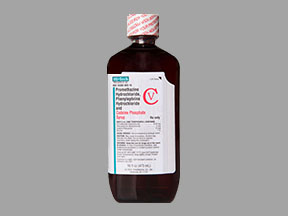
Promethazine-phenyleph-codeine Coupons & Savings Card – Discount Prices from $17.07
Generic for: Promethazine vc/codeine
This medication is a combination drug used to alleviate symptoms associated with the common cold, flu, allergies, or respiratory conditions such as sinusitis and bronchitis. It contains three active ingredients: Promethazine, Phenylephrine, and Codeine. Promethazine is an antihistamine that helps reduce symptoms like watery eyes, itchy eyes, nose, or throat, runny nose, and sneezing. Phenylephrine acts as a decongestant, alleviating nasal congestion. Codeine, an opioid cough suppressant, works on the brain to decrease the urge to cough. It's important to note that opioid cough suppressants should not be administered to children under 18 due to the risk of severe, potentially fatal side effects, including breathing issues. Discuss with your doctor the risks and benefits of using this medication. Remember, cough and cold medicines do not cure colds, and often, a cough from a common cold does not require medication. Consider alternative remedies such as staying hydrated, using a humidifier, or applying saline nose drops or spray for relief.
Our coupons are free to use. Before paying, show the pharmacist your Promethazine-phenyleph-codeine savings card to get your free discount. Use our filters below to edit the prescription box to match your needs. The Promethazine-phenyleph-codeine prices will update based on your prescription needs. Above our Promethazine-phenyleph-codeine coupons, you can change your location to see pharmacy prices and costs in other areas. We're here to help you buy Promethazine-phenyleph-codeine at the lowest price with our prescription discount card.
My prescription
Edit
118ML of 6.25-5-10MG/5ML, Promethazine-phenyleph-codeine (1 Bottle)
Select pharmacy

CVS
$61.91
COUPON PRICE
Albertsons
$17.07
COUPON PRICE
Walgreens
$28.51
COUPON PRICE
Walmart
$53.79
COUPON PRICEPromethazine-phenyleph-codeine savings card
Show this card to your pharmacist
Albertsons
$17.07
BIN
ID
PCN
GRP
019876
LH820CF38F
CHIPPO
LHX
Powered by
This medication is a combination drug used to alleviate symptoms associated with the common cold, flu, allergies, or respiratory conditions such as sinusitis and bronchitis. It contains three active ingredients: Promethazine, Phenylephrine, and Codeine. Promethazine is an antihistamine that helps reduce symptoms like watery eyes, itchy eyes, nose, or throat, runny nose, and sneezing. Phenylephrine acts as a decongestant, alleviating nasal congestion. Codeine, an opioid cough suppressant, works on the brain to decrease the urge to cough. It's important to note that opioid cough suppressants should not be administered to children under 18 due to the risk of severe, potentially fatal side effects, including breathing issues. Discuss with your doctor the risks and benefits of using this medication. Remember, cough and cold medicines do not cure colds, and often, a cough from a common cold does not require medication. Consider alternative remedies such as staying hydrated, using a humidifier, or applying saline nose drops or spray for relief.
Our coupons are free to use. Before paying, show the pharmacist your Promethazine-phenyleph-codeine savings card to get your free discount. Use our filters below to edit the prescription box to match your needs. The Promethazine-phenyleph-codeine prices will update based on your prescription needs. Above our Promethazine-phenyleph-codeine coupons, you can change your location to see pharmacy prices and costs in other areas. We're here to help you buy Promethazine-phenyleph-codeine at the lowest price with our prescription discount card.
Promethazine-phenyleph-codeine dosage forms
Use our Promethazine-phenyleph-codeine 118ML of 6.25-5-10MG/5ML coupon with prices from $17.07 for 1 Bottle. You can also use our Promethazine-phenyleph-codeine 118ML of 6.25-5-10MG/5ML coupon with prices from $26.65 for 2 Bottles. We have a Promethazine-phenyleph-codeine 118ML of 6.25-5-10MG/5ML coupon with prices from $36.22 for 3 Bottles.
Dosage Quantity Price from Per unit 118ML of 6.25-5-10MG/5ML 1 Bottle $17.07 $17.07 118ML of 6.25-5-10MG/5ML 2 Bottles $26.65 $13.32 118ML of 6.25-5-10MG/5ML 3 Bottles $36.22 $12.07
| Dosage | Quantity | Price from | Per unit |
|---|---|---|---|
| 118ML of 6.25-5-10MG/5ML | 1 Bottle | $17.07 | $17.07 |
| 118ML of 6.25-5-10MG/5ML | 2 Bottles | $26.65 | $13.32 |
| 118ML of 6.25-5-10MG/5ML | 3 Bottles | $36.22 | $12.07 |
